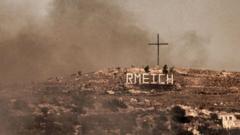In light of the continuing Israel-Hezbollah conflict, Rmeish, a Lebanese border town primarily inhabited by Maronite Christians, has become a focal point of resilience. Though many have fled, the town's inhabitants are resolved to endure, despite the damage and instability around them. Local leaders emphasize their unwavering commitment to their community and nation, even as essential supplies dwindle and their safety hangs in the balance.
Resilience Amid Conflict: Rmeish Residents Hold Firm Despite Ongoing Violence

Resilience Amid Conflict: Rmeish Residents Hold Firm Despite Ongoing Violence
As the Israel-Hezbollah war wreaks havoc in southern Lebanon, the small town of Rmeish remains steadfast with its residents determined to stay amidst the chaos.
The ongoing conflict between Israel and Hezbollah has led to mass displacement in Lebanon, with many towns succumbing to violence. However, Rmeish, located just 2 kilometers from the border, is witnessing a unique narrative of determination among its 7,000 residents, primarily Maronite Christians. Despite being in the line of fire, the community has chosen to remain.
“Our homes are damaged—about 90% are affected by the airstrikes—but we will not leave. We are resolved to stay even if we cannot sleep at night due to constant bombardment,” shares Jiries al-Alam, a local farmer and undertaker. So far, the residents have avoided casualties, though some have suffered losses—like al-Alam, who lost 200 cattle due to military flares.
Rmeish has not received a mandatory evacuation order from the Israeli military, making it a notable exception in a region rife with conflict. Following the Hamas attack on Israel on October 7, 2023, Hezbollah responded with rocket fire into northern Israel, instigating retaliatory strikes that have now encircled Rmeish.
The local priest, Father George al-Ameel, emphasizes the peaceful intentions of the town's people. “We want to convey that we’re not involved in this conflict. Families have raised white flags to symbolize our desire for peace,” he explains.
Rmeish has been directly affected by the military operations, particularly after Israel launched a ground invasion of southern Lebanon. Residents have reported that airstrikes have come alarmingly close, prompting some families to relocate due to damaged homes. Rasha Makhbour, who moved her family after their house was hit, expressed her belief that the rocket that impacted her home likely originated from outside Lebanon.
Amidst these challenges, the town remains resilient. There has been a drastic displacement of people; the UN indicates that over 640,000 individuals have fled southern Lebanon. Various accusations regarding loyalty have surfaced towards the residents of Rmeish, with some questioning their allegiance to Lebanon.
Local leaders have rejected these claims. Mayor Milad al-Alam stated, “We’re not collaborators; our commitment is to our identity and our country.” The situation has led to increasing isolation for Rmeish, particularly after recent attacks left key routes cut off, limiting access to crucial supplies such as food and medication.
Despite a single UN aid convoy reaching the town, essential goods are running low, leading to understandable anxiety among residents. “There’s nothing left in stores. With supplies diminishing, we’re struggling,” Jiries al-Alam laments.
Yet, the community's spirit showcases a deep-seated resolve. During harvest season, the locals intend to rely on olives as a means of sustenance. “We will find ways to survive here; we will choose to remain in our homes even if it costs us dearly,” emphasizes al-Alam, reflecting the sentiment resonating throughout Rmeish.
As the months progress, the community's memory as a symbol of resilience amid turmoil is likely to endure, serving as a poignant reminder of the human spirit's determination even in the face of overwhelming adversity.




















